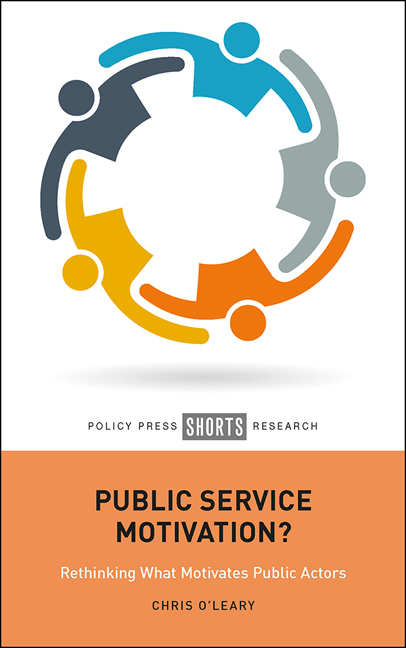three - The public in public service motivation theory
Published online by Cambridge University Press: 12 October 2022
Summary
Introduction
One of the oldest and dominant views of government work is that there is no finer, or more noble, calling than public service. Through public service, individuals put aside their own interests and work to further the greater good. Barry Bozeman (2007) explains that the public interest is a means of ‘conceptualising, explaining, and, sometimes, prescribing collective good’ (p 86), and discussions of the common good, of public values, and of the public interest have been core to political debate for many centuries.
It is also the case that the public interest plays a pivotal role in PSMT. Indeed, for many, the basis of public service motivation is a personal desire to further the public interest. Given this, PSMT should be expected to be able to address some basic questions:
• How do public servants define and understand the public interest?
• How do they identify what is in the public interest?
• How do they test this with the public?
• How do they respond when their actions are not supported by the public?
This chapter considers these questions. It starts by discussing the concept of the public interest, what it means and how it is understood. It then considers the role that the public interest plays in PSMT. The argument developed here is that it plays a pivotal role, and as such questions about how PSMT specifies how public service- motivated public servants understand, seek to further, make decisions around how to, and know whether they have, furthered the public interest are core to an evaluation of the usefulness and completeness of PSMT.
Defining the public interest
The public interest is the dominant language of public employees, politicians and governments (O’Leary, 2019). It has a long and veritable tradition, and appears in the works of political philosophers from Plato onwards (Held, 1970). While its importance as an academic concept has changed over the last 80 years, the idea of the public interest nevertheless has enduring appeal. It has been core to many debates, within and without academia; politicians, public servants, professions and the courts all draw on the public interest to promote and justify their actions and decisions. It is the ‘first and oldest theory’ of government regulation (Yandle, 2011), a core and significant area of government activity and an area where public interest theory is most developed.
Information
- Type
- Chapter
- Information
- Public Service Motivation?Rethinking What Motivates Public Actors, pp. 51 - 72Publisher: Bristol University PressPrint publication year: 2022
